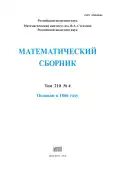Том 210, № 4 (2019)
Асимптотика собственных чисел длинных пластин Кирхгофа с защемленными краями
Аннотация
 3-26
3-26


Группы гомеоморфизмов прямой и окружности. Критерии почти нильпотентности
Аннотация
 27-40
27-40


Основания $(2n, k)$-многообразий
Аннотация
 41-86
41-86


Сходимость процессов сплайн-интерполяции и обусловленность систем уравнений построения сплайнов
Аннотация
 87-102
87-102


Линейная совместная коллокационная аппроксимация для параметрических и стохастических эллиптических дифференциальных уравнений с частными производными
Аннотация
 103-127
103-127


 128-144
128-144


Эквивалентность тригонометрической системы и ее возмущений в пространствах $L^p$ и $C$
Аннотация
Пусть $B=B[-\pi,\pi]$ – какое-нибудь из пространств $L^p(-\pi,\pi)$, $1\leq p< \infty$, $p\neq 2$, $C[-\pi,\pi]$, пусть $B_a=B[-\pi+a, \pi+a]$, $a\in\mathbb{R}$. Получен ряд условий (как необходимых, так и достаточных) для того, чтобы “возмущенная тригонометрическая система” $e^{i(n+\alpha_n)t}$, $n\in\mathbb{Z}$, была эквивалентна тригонометрической системе $e^{int}$, $n\in\mathbb{Z}$, в $B_a$ при любом $a\in\mathbb{R}$. В частности, показано, что если $(\alpha_n)\in l^s$, где $1/s=|1/p-1/2|$, то указанная эквивалентность имеет место, причем показатель $s$ является точным. С использованием (в том числе) этого результата доказано существование в $L^p(-\pi,\pi)$, $1< p< 2$, базисов из экспонент, не являющихся эквивалентными тригонометрическому базису.
Доказательства основаны на применении мультипликаторов Фурье.
Библиография: 18 названий.
 145-164
145-164











